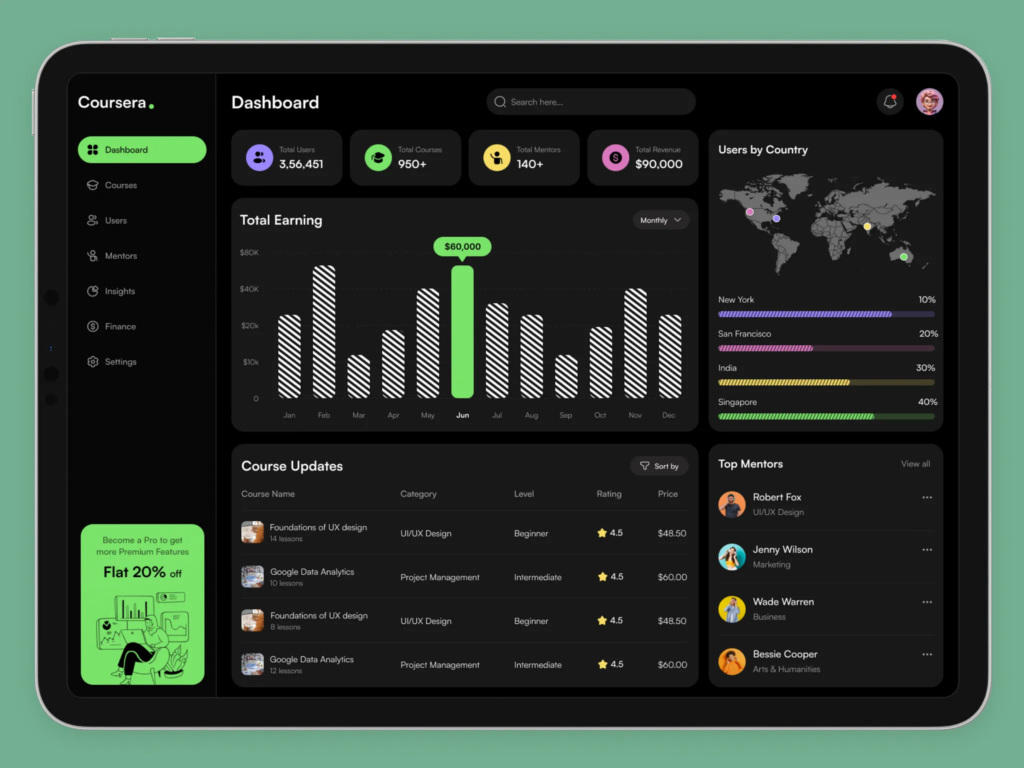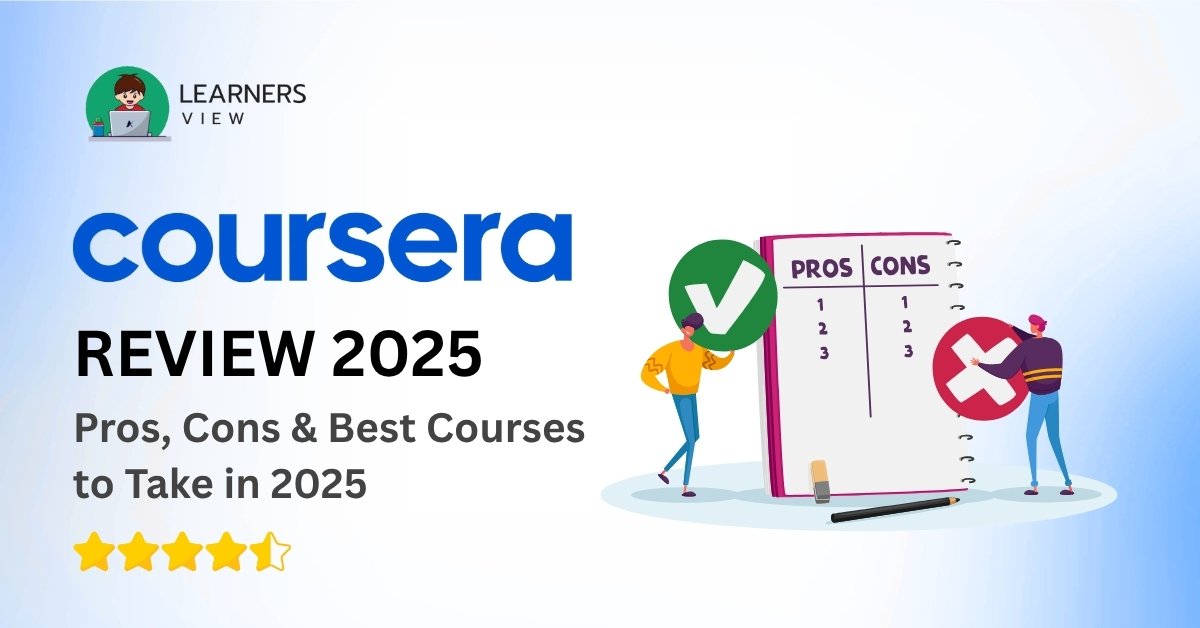Online education is booming — and if you’ve dipped your toes into learning online, chances are you’ve come across Coursera. But is it really worth your time and money?
In this in-depth Coursera review by Learners View, we’ll cover everything you need to know: from its strengths and weaknesses, to a breakdown of the best Coursera courses, and whether Coursera truly delivers on its promises in 2025.
What Is Coursera?
Coursera is one of the world’s leading online learning platforms offering university-level courses and professional certificates. Founded in 2012 by Stanford professors, it partners with 200+ top universities and companies like Yale, Google, Meta, and IBM.
It offers courses in:
- Data Science
- Computer Science
- Business
- Health
- Social Sciences
- Arts & Humanities
And much more.

How Coursera Works
Coursera allows users to:
- Enroll in individual courses (free or paid)
- Pursue certificates and specializations
- Earn degrees from accredited universities
- Learn at your own pace with flexible deadlines
There are three main learning paths:
- Free Courses (audit mode, no certificate)
- Guided Projects & Professional Certificates
- Online Degrees & MasterTrack™ Programs
Pros of Using Coursera
1. World-Class Education at Your Fingertips
Courses are created by top-tier institutions, including:
- Stanford University
- University of Michigan
- Yale University
- IBM
You’re literally learning from Ivy League and industry professionals.
2. Flexibility and Accessibility
- Learn at your own pace
- Download videos for offline access
- Accessible from mobile, tablet, or desktop
3. Certifications That Matter
Certificates can boost your resume — especially ones from:
- Google (e.g., IT Support, Data Analytics)
- IBM (e.g., Data Science)
- Meta (e.g., Front-End Development)
These are recognized by employers globally.
4. Variety of Learning Options
- Over 7,000+ courses and credentials
- Subjects range from AI to Philosophy
- Short courses, full degrees, or job-ready certificates
5. Free Learning Options
Many courses offer audit access — you can learn for free (without the certificate).

Cons of Using Coursera
1. Certificates May Not Be Fully Recognized Everywhere
While reputable, Coursera certificates are not equivalent to formal university degrees (unless you enroll in their actual degree programs).
2. Some Courses Can Be Outdated
Not all courses are updated regularly, especially in fast-evolving fields like tech or AI.
3. Subscription Model Costs Add Up
Courses under Coursera Plus require a subscription ($59/month), which can become expensive if you don’t use it regularly.
4. Limited Interactivity
Compared to bootcamps or live cohorts, Coursera can feel impersonal due to lack of live mentorship or interaction.

Coursera Pricing in 2025
| Plan | Description | Cost |
|---|---|---|
| Free | Audit-only, no certificate | $0 |
| Individual Courses | Pay per course | ~$49–$99 |
| Coursera Plus Monthly | Unlimited access to 7,000+ courses | $59/month |
| Coursera Plus Annual | Discounted yearly access | $399/year |
| Degrees | Full bachelor’s or master’s | $9,000–$25,000+ |

Is Coursera Worth It?
✅ Yes — if you’re looking for structured, self-paced learning from top institutions.
However, it’s most valuable for:
- Career switchers seeking certificates
- Students looking to enhance their resumes
- Lifelong learners
- Professionals upgrading their skills
Not ideal if:
- You need live mentorship
- You’re looking for accredited degrees (outside of Coursera’s degree programs)
- You want free certification
10 Best Courses on Coursera (2025)
Here’s a curated list of the best courses based on reviews, ratings, and career value:
1. Google IT Support Professional Certificate
- Great for beginners in tech
- Recognized by employers globally
2. IBM Data Science Professional Certificate
- Covers Python, SQL, Data Analysis
- Includes 9 mini-courses
3. Meta Front-End Developer Certificate
- Learn HTML, CSS, React
- Build portfolio-ready projects
4. The Science of Well-Being by Yale University
- Popular psychology & happiness course
- Free to audit
5. AI for Everyone by Andrew Ng
- Non-technical intro to AI
- Clear and concise
6. Python for Everybody by University of Michigan
- Beginner-friendly
- Widely recommended for new programmers
7. Financial Markets by Yale University
- Taught by Nobel laureate Robert Shiller
- Deep insights into global markets
8. Project Management Principles by Google
- Prepares you for PM roles
- Professional Certificate track
9. Machine Learning by Stanford University (Andrew Ng)
- One of the most enrolled courses ever
- Solid ML foundation
10. Introduction to UX Design by Google
- Learn UX concepts with hands-on projects

Who Should Use Coursera?
Coursera is ideal for:
- Beginners entering a new field
- Students supplementing their university education
- Working professionals enhancing their skills
- Job seekers looking to build in-demand credentials
Not ideal for:
- People needing intense mentorship
- Learners with no self-discipline
Coursera Alternatives to Consider
If Coursera doesn’t meet your learning style or goals, try these:
- edX — More academic; good for free learning and university-backed micro-degrees
- Udemy — Affordable, wide variety of practical courses
- LinkedIn Learning — Best for professional development and business skills
- Pluralsight — Great for software developers and IT professionals
Final Verdict: Is Coursera Right for You?
Coursera remains one of the best online learning platforms in 2025 due to its quality partnerships, flexible learning options, and career-focused programs.
✔ If you’re a motivated learner, want recognized certificates, or are aiming to switch careers, Coursera is a smart choice.
However, always explore whether the course is updated, if the instructors are qualified, and whether you’re getting value for the price.
✅ FAQ: Coursera Review
You can audit most courses for free, but you won’t receive a certificate unless you pay.
Yes, if you plan to take multiple courses in a year. It saves money over individual course purchases.
Author Profile
- Jiya Gupta
- At Learners View, we're passionate about helping learners make informed decisions. Our team dives deep into online course platforms and individual courses to bring you honest, detailed reviews. Whether you're a beginner or a lifelong learner, our insights aim to guide you toward the best educational resources available online.
Latest entries
 Course PlatformsOctober 3, 2025We Asked 10 Experts: What’s the Best Online Course You’ve Ever Taken?
Course PlatformsOctober 3, 2025We Asked 10 Experts: What’s the Best Online Course You’ve Ever Taken? Career GrowthOctober 2, 2025MIT OpenCourseWare Review: Can Free Courses Compete with Paid Ones?
Career GrowthOctober 2, 2025MIT OpenCourseWare Review: Can Free Courses Compete with Paid Ones? Course PlatformsOctober 1, 2025How Online Learning Changed My Career – Real Student Stories
Course PlatformsOctober 1, 2025How Online Learning Changed My Career – Real Student Stories Course PlatformsSeptember 16, 2025Best Graphic Design Courses for Freelancers
Course PlatformsSeptember 16, 2025Best Graphic Design Courses for Freelancers




